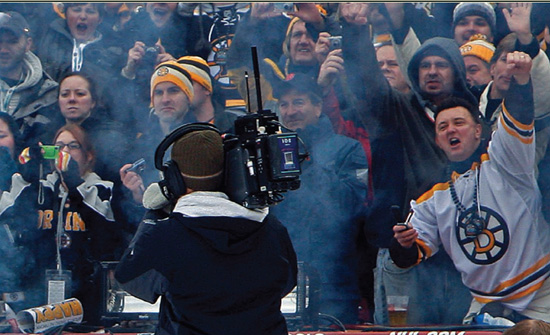Fenway Park (57 page)
Authors: John Powers
The club made an encouraging mid-June run when the National Leaguers came to town, taking eight of nine from the Phillies, Diamondbacks, and Dodgers to climb within a game of the division lead. One of the visitors was particularly familiar as Manny Ramirez returned for the first time since being traded to Los Angeles and was given a decidedly mixed reception from fans, who continued to appreciate his role in two Series triumphs even as they disdained his lackadaisical approach. “There’s no reason I should have behaved that way in Boston,” Ramirez admitted to a Spanish network announcer.
Yet “Mannywood” wasn’t behaving much differently in L.A., and so he was wearing a White Sox uniform by September. By then his former Boston teammates were stuck in third place and out of contention after both their lineup and rotation had been shredded by injuries, with 19 players spending time on the disabled list for a total of 1,013 man-games lost to injury.
Leadoff hitter Jacoby Ellsbury played only 18 games after fracturing his ribs. Pedroia missed the final three months after breaking a foot and Kevin Youkilis was sidelined for the season after tearing a thumb muscle. Marco Scutaro injured his rotator cuff and was switched from shortstop to second base. Josh Beckett spent two months on the DL, where Daisuke Matsuzaka was placed twice.
“It’s disappointing in that we didn’t get where we want to go, but there’s still a lot to be proud of,” Epstein said on the season’s final weekend, as the Sox finished below second place for the first time in 13 years. “I’d like to rewind and start over and do 162 again and see how it turns out.”
As they had during the first six years after the ballpark had opened, the Fenway faithful had become accustomed to Soxtober—watching the hometown team playing for a championship—and Sox President Larry Lucchino had promised them “the constant, unwavering commitment to winning.” So as Mike Lowell, Victor Martinez, and Adrian Beltre departed, the front office moved boldly to sign stars Adrian Gonzalez from San Diego and Carl Crawford from Tampa Bay for 2011.
With a $161 million payroll and 15 All-Stars on the roster, the club was widely touted as the likely champion in spring training. “We have a lot of work to do but I can see why people are talking about going back to the World Series,” acknowledged rightfielder J.D. Drew. “On paper, we have that kind of team.”
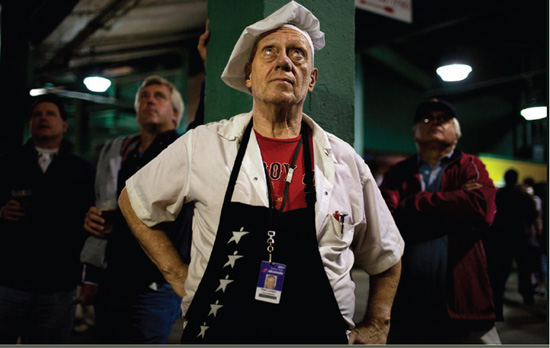
A Fenway Park concession-stand worker watched Red Sox-Yankees action on a television monitor in mid-September 2007.
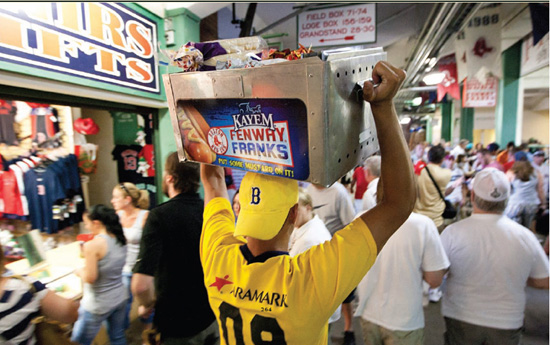
Fenway Franks made their way through the park concourse before a game against the Toronto Blue Jays in July 2011.
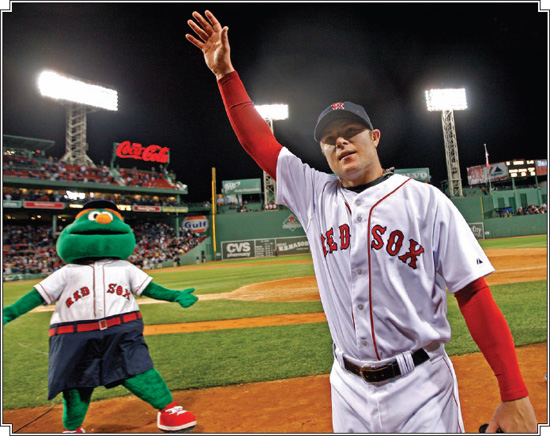
Just two years after battling cancer, left-hander Jon Lester threw the 18
th
no-hitter in Red Sox history—and the team’s fourth of the 2000s—beating the Kansas City Royals, 7-0, at Fenway Park on May 19, 2008. Jason Varitek was behind the plate, setting a major-league record by catching the fourth no-hitter of his career.
But the fact that the opener at Texas was played on April Fool’s Day might have been an omen about the historic pratfall that was to follow. Boston lost its first six games to the Rangers and Indians; it was the team’s worst start since 1945 when most of its top players were wearing Uncle Sam’s uniform. “It can’t get any worse than this,” third baseman Kevin Youkilis declared after the Sox lost 1-0 at Cleveland on a squeeze bunt in the eighth inning to go 0-6.
The 100
th
opening day at Fenway brought a delightful turnaround as the hosts drilled the Yankees 9-6. “I’ve never seen a team so happy to be 1-6,” observed Francona. The upward ascent took time, though. It wasn’t until May 16 that the club had a winning record and not until May 27 that it climbed past New York into first place.
Boston still was there at the beginning of September but an unsightly 10-0 home loss to Texas was the first misstep in a fatal tumble. Though the Sox still had a comfortable nine-game lead over Tampa Bay in the wild-card race, they soon went into free fall en route to the worst September swoon (7-20) in major-league history.
“It’s crazy,” proclaimed designated hitter David Ortiz after the players were hooted off the diamond for losing the Fenway finale to the last-place Orioles. “I’ve never seen anything like that around here as long as I’ve been here. If you would have told me in August this would happen in September, I would have laughed at you.”
Going into the final six games at New York and Baltimore, Boston still had a two and a half game edge over the Rays for the wild-card spot. But the tailspin continued as the visitors lost two of three in the Bronx, needing Jacoby Ellsbury’s three-run homer in the 14
th
to salvage the finale.
THRILLS, CHILLS, SPILLS
For years it had been easy to forget New England’s hockey roots. In the first decade of the new century, the Bruins got lost in the championship seasons of the Red Sox, Patriots, and Celtics. But on New Year’s Day 2010, Boston reminded North America that the Hub is still a hockey town. (And, 18 months later, they would finally bring home the Stanley Cup.)
In the third NHL Winter Classic, 38,112 stoic souls stood in the cold at Fenway Park for three hours before they were rewarded with a 2-1 Bruins victory over the Philadelphia Flyers on a tip-in goal by Marco Sturm in the second minute of extra time.
“It’s the perfect day for hockey in Boston,” said Bruins legend Bobby Orr, who skated to center ice for a ceremonial pregame handshake with Flyer nemesis Bobby Clarke after leading the Black and Gold onto the infield ice. “It’s a thrill to see all these pros turn into kids again for one day. This is how we all started playing hockey—outdoors. And this day, here at Fenway Park, truly is a classic.”
It was a day that could scarcely have been imagined when Fenway opened in 1912, a dozen years before the Bruins would take the ice for the first time.
The postcard-perfect afternoon lacked the Currier & Ives snowfall that marked the previous day’s photogenic practice session, but everything else worked out the way it was sketched on the NHL blueprint.
Late in the third period, comedian Lenny Clarke came out to lead the singing of “Sweet Caroline,” and the Red Sox magic took over. Mark Recchi scored a power-play goal with 2:18 remaining, and then Sturm potted the OT winner. It was time to cue up “Dirty Water.” No one wanted to leave on the day Fenway put on its snow pants and we all came home to hockey.
“It’s Fenway Park. It’s history. It’s something you’re going to remember the rest of your life,” said the Bruins’ Patrice Bergeron. “You want to be on the good side of the outcome. You want to win.”
One day later, they played the AT&T Legends Classic for charity, and 33,000 fans showed up to watch former Bruins, including Cam Neely, Brad Park, and Terry O’Reilly, skate with celebrities such as Tim Robbins, Denis Leary, Bobby Farrelly, and Kiefer Sutherland.
“I don’t know how many people can actually say they skated in front of 33,000 people,” said Sutherland afterward. “In the middle of a snowstorm, they stayed. I’ve never seen fans like that. It was pretty awesome.” The game raised $200,000 apiece for the Bruins and Red Sox charitable foundations, and for a third charity, Hockey Fights Cancer.
Before they took the boards down a week later, Boston University and Boston College clashed in the college version of the Winter Classic—with BU winning, 3-2, in a battle of the previous two NCAA hockey champions before 38,472 fans.
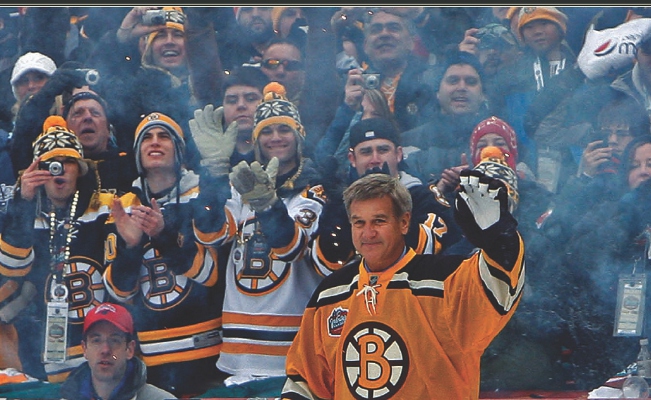
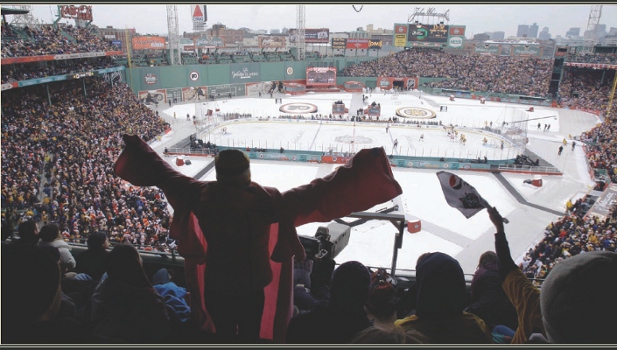
Hockey fans in Boston were treated to a wondrous sight: a rink set up in front of the Green Monster at Fenway Park, where the Bruins and Philadelphia Flyers squared off in the NHL Winter Classic on New Year’s Day 2010. Even better, team and regional icon Bobby Orr led the B’s onto the ice for the start of the game, and his counterpart was longtime rival Bobby Clarke of the Flyers. The Bruins prevailed on this day, 2-1, on an overtime goal by Marco Sturm.
